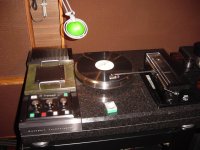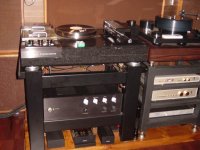Order in the court!
The designations 2nd, 3rd, 4th, etc. aren't referring directly to the harmonic frequencies themselves.
They're referring to the order of the nonlinearity that's producing those harmonic frequencies.
For a 1kHz input stimulus, a 2nd order nonlinearity produces a harmonic at 2kHz, a 3rd order nonlinearity at 3kHz, and so on.
It's common to just shorten it to "2nd harmonic," "3rd harmonic," etc.
This is also what gives rise to the terms "odd order" and "even order."
se
The designations 2nd, 3rd, 4th, etc. aren't referring directly to the harmonic frequencies themselves.
They're referring to the order of the nonlinearity that's producing those harmonic frequencies.
For a 1kHz input stimulus, a 2nd order nonlinearity produces a harmonic at 2kHz, a 3rd order nonlinearity at 3kHz, and so on.
It's common to just shorten it to "2nd harmonic," "3rd harmonic," etc.
This is also what gives rise to the terms "odd order" and "even order."
se
They're referring to the order of the nonlinearity that's producing those harmonic frequencies.
This is also what gives rise to the terms "odd order" and "even order."
 Thanks Steve, that's what I've always thought.
Thanks Steve, that's what I've always thought.[snip]Now Jan, that's not what you've said about the LP earlier in this thread.
[snip]John
Yes, I bought a turntable again after 30 years and still love it! I also love my wife although she didn't manage to get elected Miss Holland. So?
It was Joachim Gerhard who talked me into buying a TT: "Jan, it's a man thing; taking out the record, carefull inspection, blowing off dust etc etc, lowering the stylus in the groove, etc etc.". And I still love it (did I say that already?).
Now, you want to talk about LP technology vs CD technology, or why vintage LP sounds often better than modern digital re-releases? Ohhh, you've been doing that the last several months? OK...
jan
Yes, I bought a turntable again after 30 years and still love it! I also love my wife although she didn't manage to get elected Miss Holland. So?
jan
Did she enter the competition?
janneman said:Now, you want to talk about LP technology vs CD technology, or why vintage LP sounds often better than modern digital re-releases? Ohhh, you've been doing that the last several months? OK...
Yes, it really pisses me off when I can't enjoy or even listen to some of my favorite music cause the recording sounds crappy.
So, maybe you have the answer? Why is it that LP often sound so much better than the digital re-release, even when someone like Alan Parsons explains in the liner notes all the great pains he went to make this an outstanding remaster - but it's still sounds bad. Yet the LP re-releases don't have the same bad sound?
Yes, it really pisses me off when I can't enjoy or even listen to some of my favorite music cause the recording sounds crappy.
So, maybe you have the answer? Why is it that LP often sound so much better than the digital re-release, even when someone like Alan Parsons explains in the liner notes all the great pains he went to make this an outstanding remaster - but it's still sounds bad. Yet the LP re-releases don't have the same bad sound?
Same here, great stuff from the 60's/70's comes with liner notes about getting the original engineer out of retirement "to do it right" and it still sounds like do-do. How were the Beatles remasters, I don't listen to them myself?
I do plan on getting a PCM recorder in the near future and make some recordings for some of my high quality LP recordings. This is because the CD counter parts absolutely suck. Not, due the CD format but because the recording industry has it's head up it's a$$.
Once upon a time there were audiophiles and there were recording engineers. The recording engineers knew the limitations of their format, the vinyl phonograph record and how to make the most out of them. They had quite a bag of tricks up their sleeves. And because one of the accepted tricks was to equalize their monitor speakers to be "flat" there was some degree of standardization.
Today the recording engineers to a large extent I think come from the ranks of audiophiles. They do not have a bag of tricks, they do not want a bag of tricks. They do not have any standardization. They have created a product which has so many variables inherent in it that no single sound system can begin to cope with them. And they mercilessly reveal many of the shortcomings of the rest of the technology that were masked in the past. Small wonder they are so commonly disliked by audiophiles. After all, they are created by those of their own number who think exactly like they do.
That's actually the 6th harmonic. 1 khz is the fundimental frequency. 2 khz is the first harmonic.
No. 1kHz is the fundamental, basic, or 1st harmonic (in the image posted). 2kHz is the 2nd harmonic etc. You should study elementary terminology.
Harmonic - Wikipedia, the free encyclopedia
Last edited:
Same here, great stuff from the 60's/70's comes with liner notes about getting the original engineer out of retirement "to do it right" and it still sounds like do-do. How were the Beatles remasters, I don't listen to them myself?
Unfortunately, the original engineer is now a doddering senior with hearing aids. The other problem is the inevitable deterioration of the master tapes over time.
Once upon a time there were audiophiles and there were recording engineers. The recording engineers knew the limitations of their format, the vinyl phonograph record and how to make the most out of them. They had quite a bag of tricks up their sleeves. And because one of the accepted tricks was to equalize their monitor speakers to be "flat" there was some degree of standardization.
Today the recording engineers to a large extent I think come from the ranks of audiophiles. They do not have a bag of tricks, they do not want a bag of tricks. They do not have any standardization. They have created a product which has so many variables inherent in it that no single sound system can begin to cope with them. And they mercilessly reveal many of the shortcomings of the rest of the technology that were masked in the past. Small wonder they are so commonly disliked by audiophiles. After all, they are created by those of their own number who think exactly like they do.
Really? Really? Really? Naah! Producers and "Artists" have nothing to do with it? Ever look at the schools that turn out recording "engineers?" Ever read a book about how to record?
All old concert halls are good concert halls, because the bad ones got torn down!
Unfortunately, the original engineer is now a doddering senior with hearing aids. The other problem is the inevitable deterioration of the master tapes over time.
Thanks SY, last month I was fixing old Studer Revox PR99 reel to reels to bring out old archived tapes. Sound just great, but perhaps I forgot my hearing aids so the deterioration was hidden from me.
Really old tapes stored badly do deteriorate, no question. I was pleased to see how well 30 year old tapes seemed perfect!
All old concert halls are good concert halls, because the bad ones got torn down!
Old concert halls never die, they just get "modernized." I've got a publication from ASA documenting the "refurbishing" of over 200 concert halls around the world, about half of them in the US. The one thing they have in common is the successful effort to reduce RT. The goal is to get RT from 1.8 to 2.0 at mid frequencies. Most run about 1.0 at 8khz. Personally I like much longer ones, say 2.5 to 3.0, even 3.5. Long RTs give a richer fuller sound but they do tend to blur notes played in rapid succession in what is called loss of definition unless music with say 16th and 32nd notes is played slightly more slowly. The more modern halls with short RTs are what are termed "dry." The are more suited to mid to late 20th century music which I mostly don't like than they are to earlier music. Worst of all are the ones with electronic sound reinforcement systems. I see no point to going to a concert when what I'm hearing is coming out of a loudspeaker. I could hear that at home.
Today the recording engineers to a large extent I think come from the ranks of audiophiles. They do not have a bag of tricks, they do not want a bag of tricks. They do not have any standardization. They have created a product which has so many variables inherent in it that no single sound system can begin to cope with them. And they mercilessly reveal many of the shortcomings of the rest of the technology that were masked in the past. Small wonder they are so commonly disliked by audiophiles. After all, they are created by those of their own number who think exactly like they do.
Interesting. I rarely find the same issues when they do remasters on SACD. Maybe it's the CD format that they have problems with, and the format that needs the bag of tricks to sound good?
Same here, great stuff from the 60's/70's comes with liner notes about getting the original engineer out of retirement "to do it right" and it still sounds like do-do. How were the Beatles remasters, I don't listen to them myself?
I bought one of them, Abbey Road, and it sounded pretty good. I have nothing to compare to though since I haven't bought Beetles albums in the past.
The designations 2nd, 3rd, 4th, etc. aren't referring directly to the harmonic frequencies themselves.
They're referring to the order of the nonlinearity that's producing those harmonic frequencies.
For a 1kHz input stimulus, a 2nd order nonlinearity produces a harmonic at 2kHz, a 3rd order nonlinearity at 3kHz, and so on.
It's common to just shorten it to "2nd harmonic," "3rd harmonic," etc.
This is also what gives rise to the terms "odd order" and "even order."
se
Ahhh but of course! Very good post Steve, thanks. Makes it all fall into place for me.
jan
Yes, it really pisses me off when I can't enjoy or even listen to some of my favorite music cause the recording sounds crappy.
So, maybe you have the answer? Why is it that LP often sound so much better than the digital re-release, even when someone like Alan Parsons explains in the liner notes all the great pains he went to make this an outstanding remaster - but it's still sounds bad. Yet the LP re-releases don't have the same bad sound?
No, I don't have an answer to that. Sorry...
jan
I got an elightenment when Richard Gere played a record for his girlfriend on a huge turntable with tangential air tonearm ( Rockport ? ). I can not remember the film, maybe Pretty Woman. She was mighty impressed. That´s where the "Man Thing" story comes from.
Rockport? This is one of 4 remaining in the world, and the ONLY one with 45 and 78 speed. Two others are at Sony.
The rack in the bottom has the (inaudible) vacuum system.
Saw this at an audiophile friend in Bandung, Indonesia many years back.
jan
Attachments
- Status
- Not open for further replies.
- Home
- Member Areas
- The Lounge
- John Curl's Blowtorch preamplifier part II

